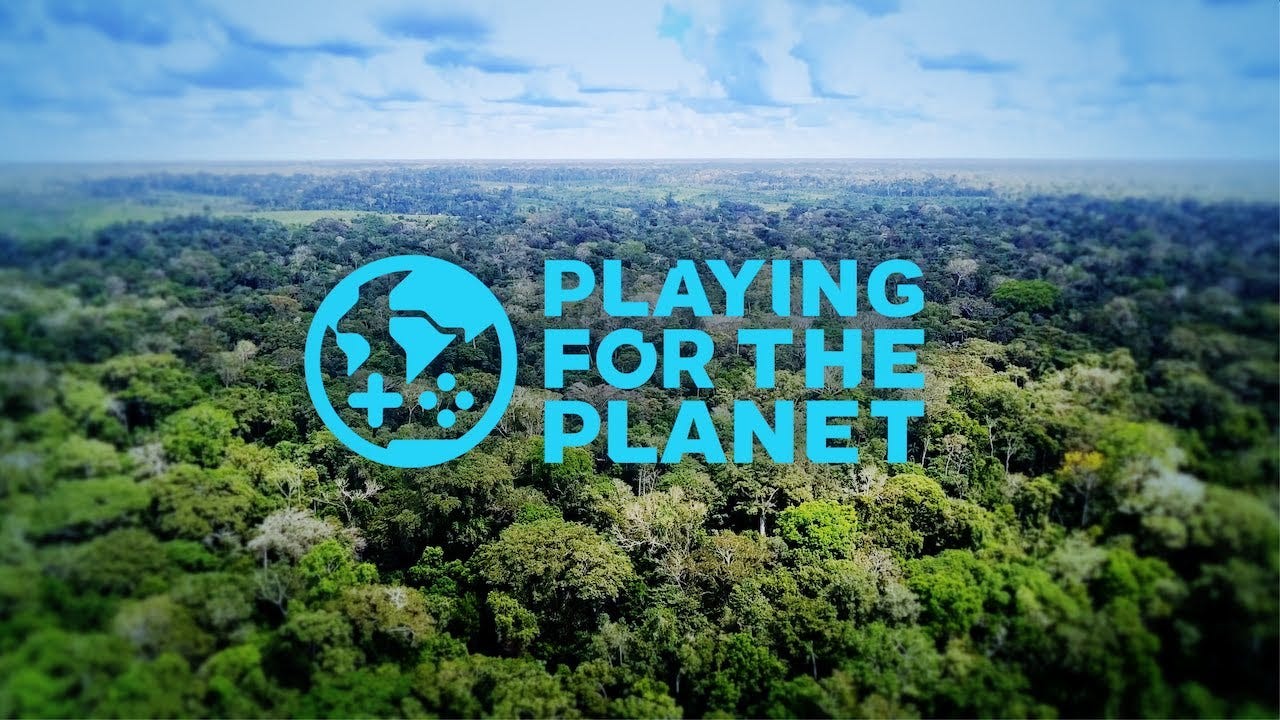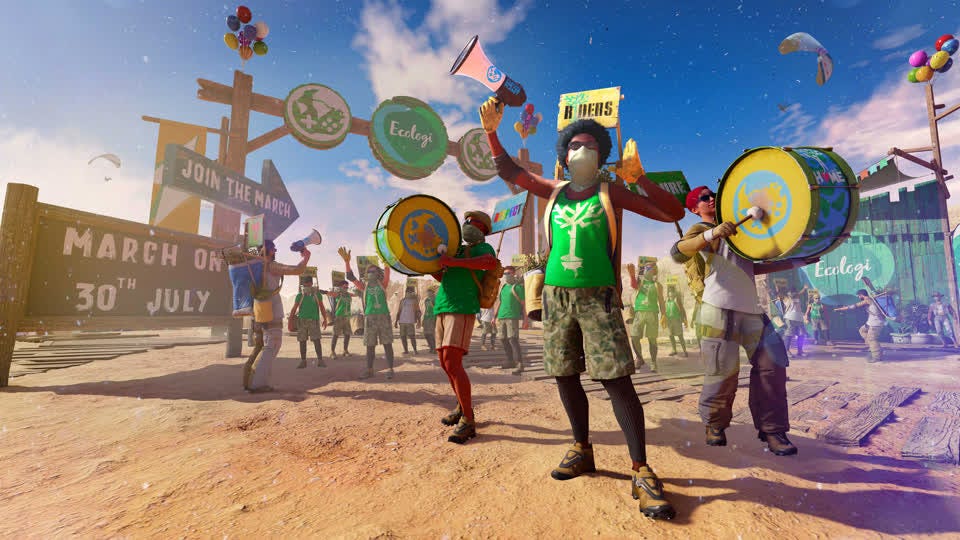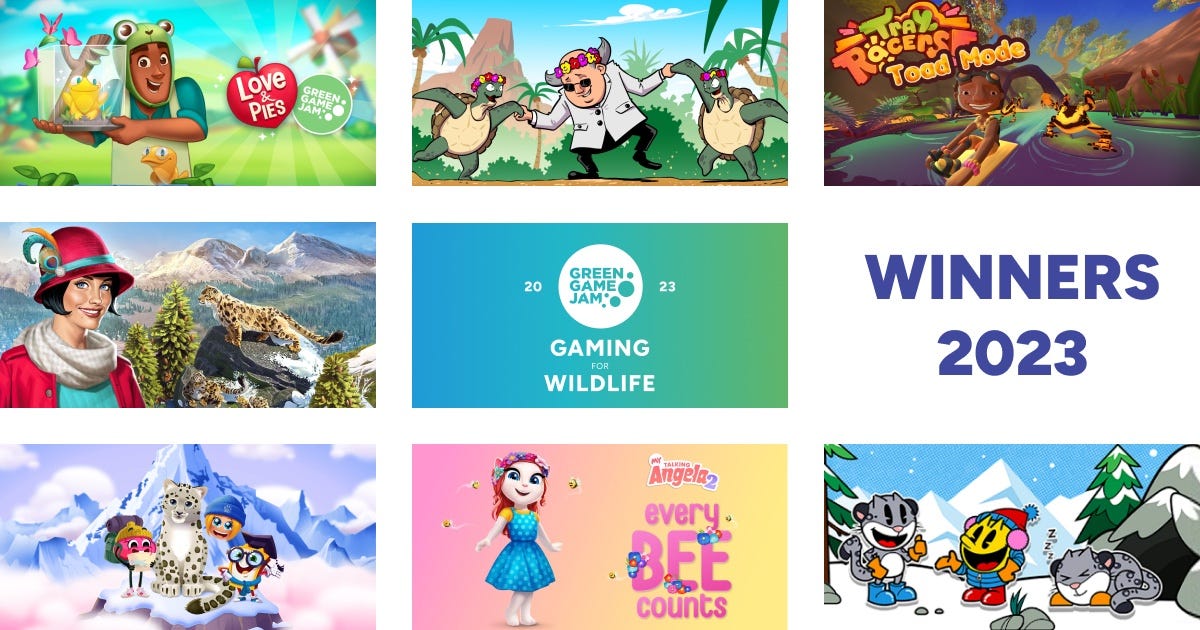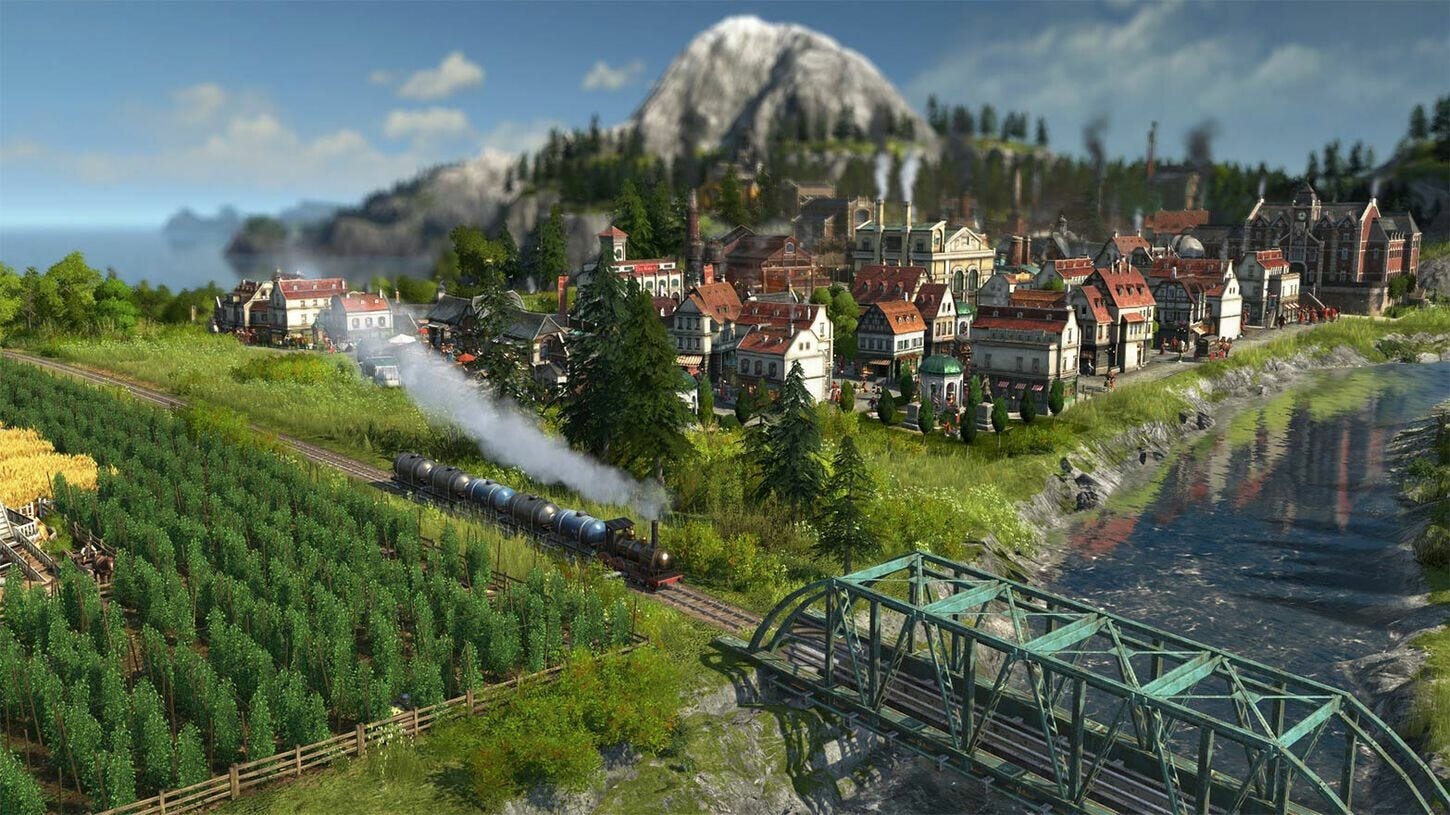Interview: Why the United Nations is getting involved in video games
Your latest digest of video game and climate change news from the past two weeks.
Welcome to the latest edition of Play Anthropocene!
We’ll be taking a short break over the Summer, meaning the next edition of the newsletter will be in your inboxes in four weeks time, on August 8th.
With that in mind, I thought I’d sign off with something a little different this week. Hope you enjoy!
UNEP’s Chief of Education for Youth and Advocacy explains how the UN became a key games industry player
We mention Playing For the Planet pretty frequently at Play Anthropocene, and for good reason. The United Nations’ alliance of climate aware industry stakeholders is often at the forefront of the fight to create a greener gaming sector, and so many of the trends and developments we explore in this newsletter are usually connected to the work of the coalition in one way or another.
As someone who has covered the initiative for a good few years now, I thought it would only be right to hear more about Playing For The Planet directly from the horse’s mouth, so recently gave its founder (and Chief of UNEP’s Environmental Education and Youth Unit) Sam Barratt a call to learn more about the alliance’s history, vision, and work.
Our following transcript has been edited for brevity and clarity, but I hope you enjoy reading Sam’s words as much as I enjoyed listening to them!
Your background is very much steeped in the humanitarian non-profit sector, rather than the games industry, so what was the journey that led you to founding Playing for the Planet?
I’ve spent a lot of time observing how my son was playing games; just seeing how dominant it was for his generation, but also noticing their ability to hold a captive audience immersed in narrative and adventure. I became very curious about how games as a medium can do more than any other. In music and film, you have to leave the story to participate in real world action, whereas in games you can stay in the story, mapping part of the narrative for yourself.
So we worked to commission a paper at UNEP, looking at the reach and power of games, and then off the back of that, we realised could do something significant in that space. So the [UN Secretary-General's Climate Action] Summit came up in 2019, and we had a chance to convene the CEOs of different companies across the industry. I think they were impressed and interested to think about how the UN could work with the games industry to change the narrative about what this industry is doing. Three years on, and I think we've made some good progress.
What are some of the ways in which Playing for the Planet works with coalition members? What does that relationship look like between those members and the United Nations?
We're very careful to frame our role as facilitators. So we don't want to overstep our agency, but rather hold the space where we can convene players that normally compete, and encourage collaboration. Then we can work out the shared challenges or opportunities that they could work on together to generate new outcomes. Every studio's relationship with us is slightly different depending on the team, the ambition, and the status of where they are on their journey, and also their scope of influence.
So for example, as you'll see in our Annual Impact Report, some studios have done some really ambitious things. Sega are really keen on packaging, for example, and they want to think about what they can do off the back of Football Manager to explore a new way for third parties to work with first parties around around packaging.
We’re also working to help the industry understanding their carbon contributions, looking at where the liability of each sector starts and ends, and try to come up with an approach to calibrating the carbon contribution that different stakeholders in the games industry make. So we've got a really good new paper coming out with a methodology that will allow you to calculate that contribution in clearer terms.
The final thing we do is the Green Game Jam, where live games with significant reach work around a specific theme to develop Green Activations, mainly via live updates.
There is not one size or flavour to that way that we work; it's very much adapted to the interests in the studio. But what we're always looking to do is pair stakeholders up so they can learn from each other, and work as collaborators. So often sustainability is a job that doesn't formally exist within a studio, but has usually started as something from the ground up by a team of people within that studio who are genuinely passionate about it. So what we're trying to do is create peer-to-peer relationships where we connect those people so that they can learn from each other as well.
You went to GDC earlier this year, which is usually a good place for getting some temperature reads on where the industry is heading. What were some of your key takeaways from the conference in terms of its ongoing approach to climate issues?
My sense is that I think at the top of the ecosystem, so where the likes of Xbox, Sony, Unity and others operate, are all starting to model really good work. And if you have those kinds of actors engaging with these themes, I think it signals out to the rest of the industry that this is something that everyone should take seriously.
So there's a lot of really good work happening at that level of the sector, but also the grassroots level from the bottom up. I'm really impressed with the IGDA Climate SIG, for example, which is a network of 8000-plus people working in a self organised way to think about how climate themes can be built into studios at all levels.
We’re also seeing a ripple effect from Playing For the Planet where everyone's thinking about what they can do in their own way. Activision Blizzard did a fascinating ESG report, which spells out their scope three emissions, and while I've spoken to them a lot the past couple of years, they're not in Playing 4 The Planet but they've done some fantastic work on their own.
So the thinking that we have at UNEP is about how the video games industry could be like frontier leaders in this challenge, so that other sectors can learn from them. Part of what we're trying to do is pull all the learnings and innovations taking place in this sector and then pull them across into other tech spaces to encourage them down the same road. So, for us, it's about creating an archetype.
In terms of the path ahead, it seems like a road of two extremes. There's amazing opportunities for games and their vast global reach, and in spearheading sustainability across the tech and business sectors. But then there's also the challenges that you mentioned about their carbon footprint, and the way in which that culture of consumerism can contribute to the waste and plastics issue. For you and the UN, what's the priority? Is it opportunities first, challenges later? Or is it that these two things have equal footing?
I think what I'd say is that we’re not dealing with something like cement or aviation with the games industry, and its carbon contribution doesn't equate to some of the biggest polluters on the planet. So I think we need to set it in context. Yet the opportunity for the games industry to be educating gamers around the use of power, and to be thinking about how they can signal the transition to a greener economy, is quite profound.
“We're very clear that our role at the United Nations isn't to lecture the industry about how to design their games, or to just get people to change behaviours.”
There’s also something interesting for me about further opportunities in games on real world challenges, where its technology can be used to simulate those challenges and help us understand what that could look like. So I'm really curious in the opportunities around citizen science, and the role of game engines in actually starting to input the numbers of some of the climate consequences and tipping points being predicted to see what that could lead to.
I think we're way off from that, so our priority at the moment is to really think about a engaging with players, because I think if you can activate 3.2 billion people to be more climate conscious, then I think you can do something really interesting. We also want to get the carbon footprint of the industry first of all understood, and then once it's understood, to then be managed, and not just offset.
Another part of the journey ahead is one of almost unlearning some things, because a lot of the mechanics and feedback loops in games are based around the same value systems that have led us into a climate crisis in the first place. Is helping developers move away from those unconscious worldviews something you see as part of the vision here as well?
I think so. Games that are organised around resource scarcity, where you're competing for finite opportunities, or game narratives that are built around dystopian outcomes where there's a clash of civilizations…. I think there's negative outcomes that can potentially come from that. But what I would say is that we're very clear that our role isn't to lecture the industry about how to design their games, or to just get people to change behaviours, necessarily. It’s down to us to share with the industry the opportunities through which games can engage with these themes.
Often, if you look at many games, where there’s these stunning, epic landscapes in the backdrop, nature is there, but it's never seen as something to fight for; it's just seen as something to take for granted. And so bringing nature to the foreground is a role that games can play here, which I think is quite unique and precious. But it's down to the games industry to work out what is right for their communities, and to do it their way with their narratives, so that they retain their sense of awe and wonder. I don't think it's for us to tell people that they need to start making certain types of games.
I just wanted to circle back in on Green Activations, because I know that's been a major focus for the Green Game Jam, and big players like PlayStation and Ubisoft have opted in during previous years. Why do you think Activations are such an effective tool for developers in getting involved with this kind of stuff?
Game jams are not something terribly new. But our thinking is that games with pre-existing audiences have the flexibility and the ability to integrate different themes and causes into their experience at any given time. And the jam supports the industry in doing what it likes to do, which is compete to see who can produce the game that delivers on the highest range of outcomes.
What we're also finding is that a lot of people that work in studios are already very keen on the issues we’re challenging them to explore. So there's not a huge amount of friction from anyone saying that they don't want to do this. Finally, we’re trying to get these sorts of climate themes to be seen as not just seasonal, but something that could be engaged with on a perennial basis in every game. So it's more about exploring and exposing different studios to different thinking from different partners, and seeing what they can put in place.
What are some recent examples of climate-conscious games that have really caught your eye?
I work in the ecosystems division at UNEP, and everything in ecosystems work is about keeping things in balance. So you need the right number of predators, you need the right number of resources, it's never too wet, never too dry, and so on. So games that hold the world in balance, I think, are really compelling for me. What Ubisoft has done with the Anno series, around keeping the world in balance through play, is really compelling to me, because I think it's a parable for the needs of a healthier planet.
Bringing real-time, real-life environmental jeopardy into games can also be really powerful. Riders Republic, which won the jam last year, is a good example of this. Ubisoft placed wildfires all over the American national parks in its game, and so you could actually experience the fires in the backdrop of the game as your character. I don't know if you've ever seen a significant wildfire in your life, but the psychological effect of is is just like nothing else. It makes you go cold. And so that was powerful in and of itself, but Ubisoft were pulling the game’s community together to try and put a stop to it.
What's nice is that each year we see games doing things that are even bigger and bolder. And you don't need them to be puritanically environmental or ecological, either; every game could have a mild touch environmental component if it chooses to. So for me, it's not about having a hyper deep “green game”. I think every game can touch on it through their story and design.
I imagine you’ve probably been asked this a lot, but what are your hopes for Playing for the Planet as an initiative going forward?
I think our role is to facilitate the generation of new answers to common problems. Our role is to support the industry to do the best work it can. I think we can provide a steer in direction, but it's down to the industry to make the choices that need to be made. So I see our function as a convener, as an enabler, and hopefully an accelerator in what the industry can do. But the ambition has to come from them.
I think the UN can do a lot. But really, it can only do as much as the partners want it to do. Our agency is purely through affirmation, and through guiding studios to do good work. But also we do have a bar, so if people don't do things that they say they're going to do, then they don't stay. So it really is a club for the committed.
Enjoyed this newsletter? Subscribe or spread the word about Play Anthropocene to others who might be interested, and if you have any feedback or questions, feel free to get in touch with me at PlayAnthropocene@gmail.com
Find me on Twitter: @alexavard95







